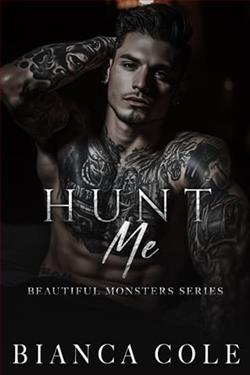Page 80 of Shadowvein
“Stay close to Mira at all times.” His tone has changed again. “Ravencross is still relatively safe, but Authority patrols move through the main thoroughfares. Your appearance should not draw undue attention dressed as you are, but your inability to speak the language will immediately mark you as foreign.”
“I understand.”
“It will give Mira the opportunity to teach you words harder to explain here. She’s a former scout. Observant, careful, and knows every path in Ravencross. You’re safe with her, as long as you do as she says.”
The concern in his voice seems genuine, though I can’t help wondering how much of it is about me, my safety, and how much is about the problems I might cause him if I drew attention from the wrong people. I don’t know which would matter more.
Mira leads me out of the room and back up to the chamber we were in yesterday. She crosses to a chest and takes out a hooded cloak similar to her own, then helps me wrap it around my shoulders and adjust the hood to partially shadow my face. Not enough to appear suspicious, but enough to soften the details. Just another face in the crowd.
“Meresh.” She points toward the door.
I follow her back up the stone steps that brought us here, and into the small hidden courtyard. Daylight greets us. I stop, one hand lifting to shield my eyes. It’s too bright after the lampglow below.
The air smells rinsed clean, and rain puddles glisten across the stones, reflecting a sky that looks almost violently blue. The storm I heard during the night has passed, but there’s still an odd echo of it in the air, like the world hasn’t quite decided whether to settle or not.
This is the first time I’ve stepped out into this world withouthimbeside me.
Mira moves ahead, guiding me through a narrow passage between buildings. We emerge onto a quiet side street that runs parallel to one of the larger roads, and the world tilts again.
The sounds of Ravencross arrive in a rush. Merchants calling their wares, conversations overlapping in that high, lilting cadence I’m still no closer to deciphering, the clatter of carts over cobblestones.
After days in the desert’s hush, and hours in the underground chamber, the noise feels like stepping into the wrong frequency. It lodges somewhere behind my eyes. My skin buzzes. I want to cover my ears, but I make myself keep walking.
Mira points to different buildings as we move, naming them slowly, carefully. I repeat each word, struggling to form sounds my tongue isn’t accustomed to making. She corrects me, sometimes demonstrating by exaggerating the movement of her lips so I can follow the pattern of it. I’m sure I sound ridiculous, but she never laughs.
“Vashnar.”She points to a squat building where people carry baskets of bread.
“Vashnar.” I echo it. It sounds like a fantasy word, something out of a novel—one I’m now living in without a map.
We keep moving. The market square opens around us, a swirl of stalls and colors and smells I can’t place. Handwoven cloth, carved talismans, dried herbs strung together like charms. Spices hang in the air—sweet, sharp, earthy.
Mira names things as we pass, and word by word, she builds a rhythm between us. Something steady. Something I can follow.
Despite the language barrier, Mira is an excellent guide and teacher. She uses gestures, expressions, and simple demonstrations to convey meaning when words fail. We develop a pattern. She provides the word, I repeat it, and she either nods approval or gently corrects me.
When we pass a stall draped in small cloth-wrapped bundles, I stop. It smells like toothpaste. It’s been days since I’ve brushed my teeth. I tap Mira’s arm, and gesture toward my mouth, then mime the motion of brushing them with my finger.
She tilts her head, considering, then smiles. She leads me toward another stall, exchanging a few words with the vendor before handing over a small bundle in exchange for a copper-colored coin.
She unwraps it, revealing small, pale resin beads with a faintly citrus-like scent. Plucking one out, she holds it up, then presses it between her teeth, exaggerating the motion as she begins to chew. After a moment, she rubs her tongue against her teeth and nods toward me expectantly.
I take one hesitantly and copy her movements. The resin softens almost immediately, coating my teeth with a cool, herbal flavor. It’s strange at first, slightly sticky, but as I work it around, it forms a light paste. Mira demonstrates again, using her tongue to rub against her teeth before swiping a finger over them to show they’re clean.
I do the same and blink in surprise. It actually works. My mouth feels fresh, like I just chewed mint leaves.
Mira nods, satisfied, and tucks the bundle into my hand, curling my fingers around it, before leading us toward a quieter square. We pause beside a small fountain, where she purchases two cups of something cold and sweet from a vendor’s cart. The liquid tastes like berries with hints of mint, crisp and fresh, cutting through the warmth rising from the streets.
We continue our walk, crossing over one of the stone bridges. The difference between the two sides becomes apparent straight away. The buildings here are newer, constructed with uniform stones in ordered rows. The streets run straight rather than following the organic twists of the western quarter. Here, everything feels flatter, like someone imposed control on a place that once grew wild. Most notably, more people wear crimson, the color Sacha said Authority officials wear.
Mira keeps us to side streets, looking around more often. She points to a large white stone building, with the Authority symbol etched above the door. Ithinkit’s the outpost Sacha mentioned. Her expression remains neutral, but her pace quickens as we pass by.
We’re almost at a bridge which leads back to the western districtwhen Mira freezes. Her fingers close around my wrist, pulling me into the shadow of a nearby doorway.
Before I can question her, I hear it—the tread of boots on stone, moving in unison.
A patrol rounds the corner, four soldiers in crimson uniforms, their armor gleaming in the midday sun. Unlike the officials I saw at the inn, these men carry weapons openly. Swords at their sides and short spears strapped across their backs. Their eyes dissect everything they see, while their expressions remain blank as they scan the street.
My pulse stutters, the air freezing in my lungs. I press into the doorway. The soldiers pass so close, I can see the etched design on one man’s shoulder plate. Their eyes sweep over the street, unreadable and assessing, but they slide past us without pausing.















